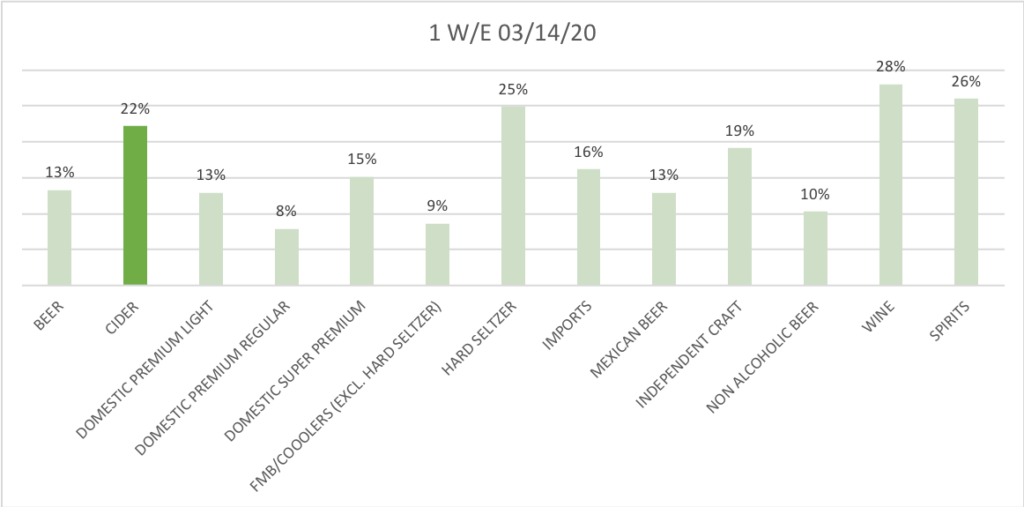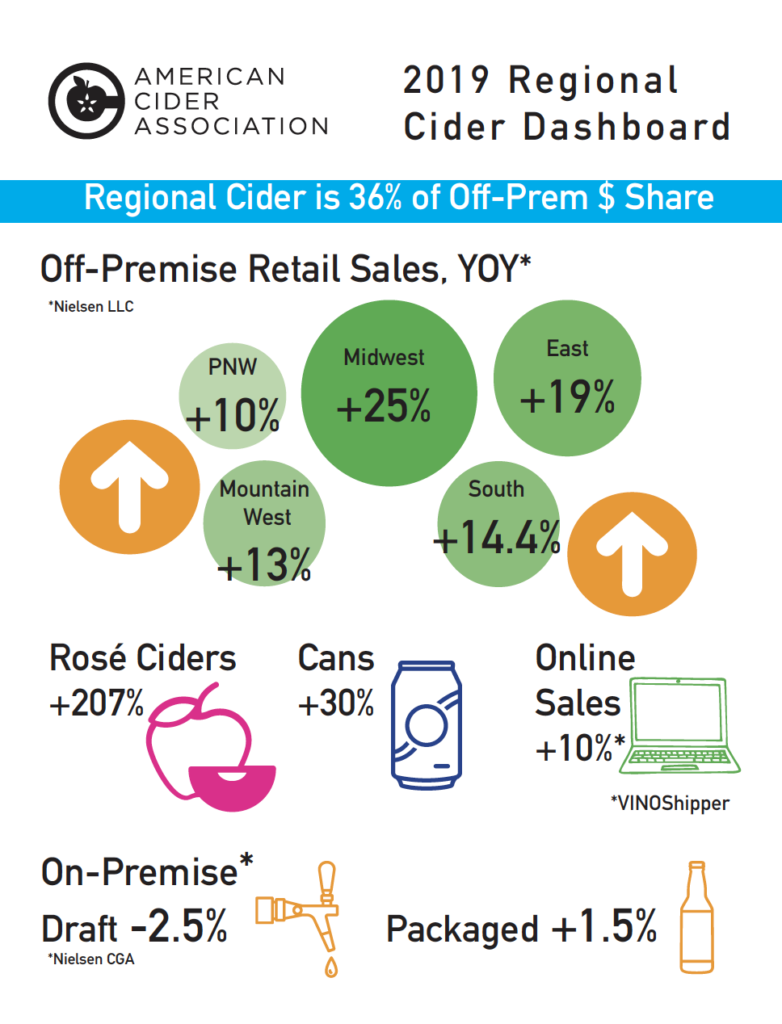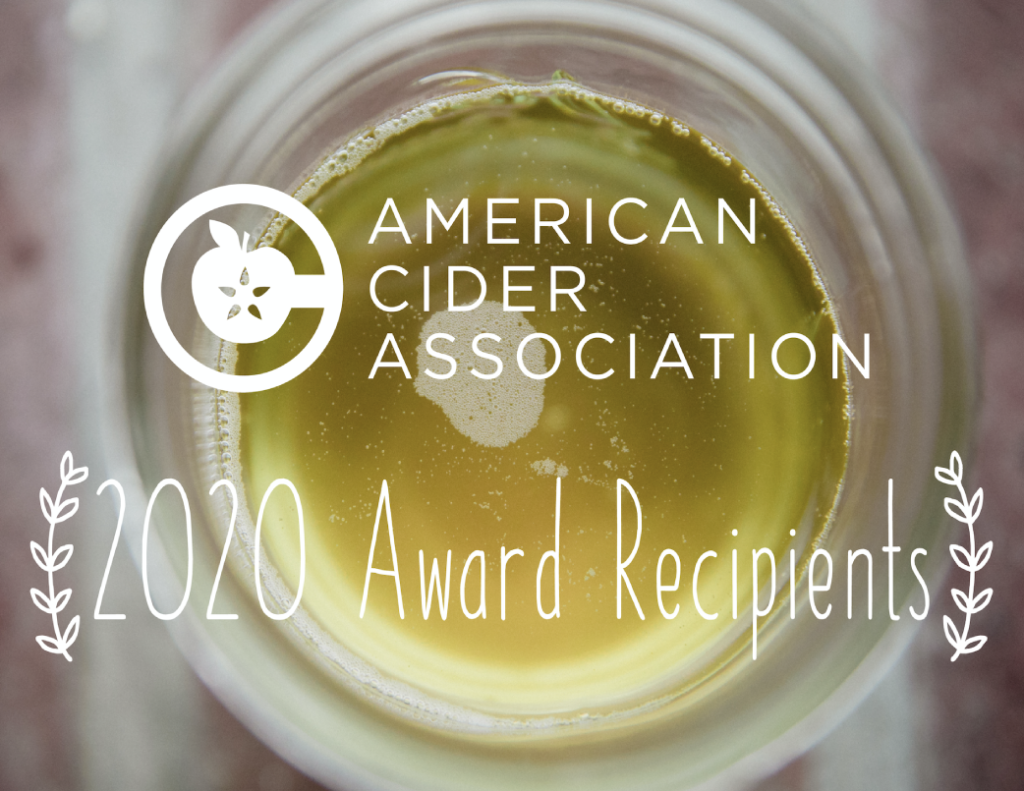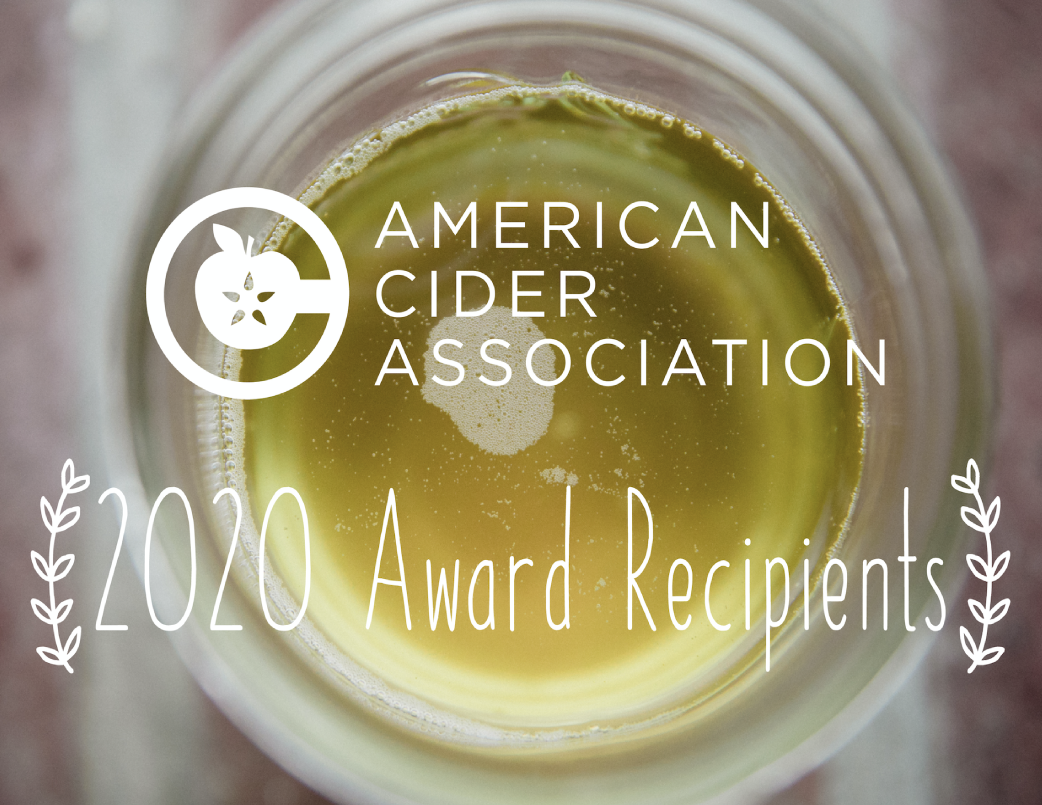Archive for March 2020
Ask a professor: Is it safe to order cider right now?
Anna Katharine Mansfield is an Associate Professor of Enology at the Cornell Craft Beverage Institute in Geneva, NY. We met Anna Katharine during the New York Cider Association’s Virtual Town Hall and followed up with some questions for our members about how to protect employees and customers from the novel Corona virus.
ACA: Is it safe to order cider for curbside pickup, delivery or online?
AKW: Yes! It’s safe, and it’s a great way to support your local cidery in a challenging time.
ACA: What is the best protocol for ensuring cideries are safely packing product for shipping or delivery with respect to the novel Corona virus? For our employees and for the product?
AKW: The good news is that you don’t need to do anything extra to ensure that your products are safe. COVID 19 is not an environmental pathogen, so continuing to follow routine cleaning and sanitizing protocols will eliminate and deactivate it. It’s also not a food-borne illness, so there’s no risk of it somehow getting into your cider and infecting a consumer. The greatest risk is person-to-person transmission, so employees within your facility should follow appropriate hand washing and social distancing protocols. It’s also a good idea to assess the high-traffic areas of your facility, like doorknobs and light switches, and clean them more frequently than you would normally; that will help prevent virus transmission if an employee is sick but asymptomatic. You can find a template for COVID 19 strategy protocols and a checklist of frequently-touched surfaces here: https://instituteforfoodsafety.cornell.edu/coronavirus-covid-19/risk-management-strategy-checklist/
ACA: How long does the virus live on cans? glass? cardboard?
AKW: We have no scientific data on aluminum or glass survival time, but do have data on cardboard, plastic, and stainless steel. In a highly-controlled lab environment, COVID 19 could be detected for up to 24 hours on cardboard, 48 hours on stainless steel, and 72 hours on plastic. It’s important to remember, however, that this experiment occurred under ideal circumstances for the virus- the surfaces were inoculated with a relatively high titer, and were protected from outside intervention. COVID 19 will not survive as well, or nearly as long, under the normal stresses of packaging and shipping. And while we don’t have experimentally-determined numbers for aluminum cans or glass, data from studies of other viruses suggests that detection times for aluminum will be similar to stainless steel, and glass will likely be less than that. COVID 19 doesn’t have extraordinary factors that would allow it to act differently than other known viruses.
ACA: Can someone contract COVID-19 from handling a packaged cider with the virus on it?
AKW: There is no evidence that COVID 19 can be transmitted via packaging, but for readers who are still nervous, we can walk through the hypothetical situation that would put a consumer at the most risk. A fictitious employee is sick, and coughs on the packaging, or wipes their nose and doesn’t wash their hands before touching the product, and manages to deposit a high concentration on the package. The consumer receives the package while the virus is still viable, touches it in exactly the spot where the virus was deposited, and then touches their own face without washing their hands. That’s a really tenuous chain of events, *all* of which have to happen- and there are several places where thoughtful intervention will break the chain. Sick employees shouldn’t be handling product; all employees should be washing their hands frequently; orders can be packed up and set aside for a time prior to pick up or delivery; and well-informed consumers are also washing their hands frequently. It’s quite a stretch, when you think of all the variables that have to line up just right.
ACA: What advice should cideries give customers to limit their risk?
AKW: If your product is distributed in exterior cardboard packaging, you can simply tell consumers to remove it and recycle it. The cans or bottles within the box will be perfectly safe. If they’re buying exposed cans or bottles, the best advice is to simply wash their hands after bringing products into the house. If they’re really concerned, they can wash the outside of the can or bottle with soap and water, but that’s not necessary- it’s just going too make them feel better. Letting them know that your employees are following appropriate cleaning and sanitizing protocols should help.
ACA: How do you ensure social distancing with deliveries and DTC online sales?
AKW: Your best bet is to have a plan in place ahead of time. Think through the steps that will happen with each delivery or sale, and figure out where social distancing risks may occur- then create protocols to avoid them. For instance, the person making the delivery can call ahead and arrange a place to leave the package so the consumer can pick it up without making direct contact. It’s wise to take payment remotely, via phone or internet, if at all possible. DTC consumers can call ahead to order, and pick up pre-packaged orders at the door or curb. With a little advance planning, social distancing should be easy.
ACA: Any other tips you want to share?
AKW: The most important thing to remember is that the danger lies in person-to-person transmission, not food borne or environmental transmission. All employees should be trained specifically in social distancing and proper hand washing techniques, and no one should come to work if they suspect that they’re ill. A rapidly growing list of FAQs and resources can be found at the Institute of Food Safety’s COVID 19 page: https://instituteforfoodsafety.cornell.edu/coronavirus-covid-19/food-industry-resources/

COVID Resources for Canadian Cideries

Hello! This is Kristen Needham Jordan from Sea Cider in British Columbia, Canada. American Cider Association has asked me to compile COVID Crisis information for the benefit of the ACA’s Canadian members, so here goes…
I’m sure I have met many of you over the years at CiderCon, Cider Summits or cider events in Canada. For those who don’t know me, I am the owner/operator of a small orchard-based cidery on Vancouver Island called Sea Cider. The COVID Crisis has hit Sea Cider hard, in several different ways, and while we are seeing an increase in sales through our online store, the overall impact has been a huge hit to our revenue and ability to cover our operating expenses.
Here are some parts of our COVID Crisis Plan:
- The goal of our crisis management plan is to improve Sea Cider’s “cash on hand” position as quickly as possible. Financial support from lenders will work in tandem with other crisis management measures Sea Cider is taking to “weather this storm” and position ourselves to bring business back up to normal levels once the health crisis has passed.
- Since sales through our Tasting Room, event sales, farmers markets, keg sales and all US sales have all stopped, we are focusing our sales & marketing efforts on our two remaining revenue streams: direct-to-consumer online sales, and bottle wholesales within BC. We have laid off some staff, significantly reduced hours for production staff, switched to work at home for sales and administrative staff and are pursuing the following supports that have been announced in Canada:
Federal Government Support
- GST remittances can be deferred until June
- Launch of a special emergency business account for small businesses that will see banks offer $40,000 government-guaranteed loans interest-free for the first year. If certain conditions are met, the first $10,000 will be forgiven.
- Friday morning, the Bank of Canada announced an unscheduled interest rate cut, slashing the key interest target by half a percentage point to 0.25 per cent
- Temporary Small Business Wage Subsidy – Will calculate 75% of payroll for the effective period (up from the 10% announced a week ago), back dated March 15th, which is subtract from the payroll remittance payment for the period: https://www.canada.ca/en/revenue-agency/campaigns/covid-19-update/frequently-asked-questions-wage-subsidy-small-businesses.html
- Work Share Program (for temporary business down turn): https://www.canada.ca/en/employment-social-development/services/work-sharing.html
- The Canada Emergency Response Benefit (CERB), which will provide $2,000 a month for up to four months for workers who lose their income as a result of the COVID-19 pandemic. Learn more at https://www.canada.ca
Provincial Government of BC Support (*Note from Michelle: Do you have information about your province? Let us know–we’re happy to share here).
- Health tax payments will be deferred until Sep 2020 with no penalties or interest:
- PST payments will be deferred until Sep 30 2020
- WCB Premium payments are being deferred
- Rental support of $500/month that individuals may access if they are tenants
Banks and Lenders
- Farm Credit Canada is setting in place both emergency lending and Interest payment deferral for farms with existing loans
- Commercial banks, such as RBC and TD, are supposed to be offering interest payment deferrals, but credit limits have not been loosened so this may be difficult for companies to access who are already max’d out
Other Suppliers
- BC Hydro is allowing businesses to defer payments. Contact them when your next bill arrives so your payment isn’t automatically processed from your bank account.
- Finally, we have been talking to some of our key suppliers to stretch out payments
Other Useful Links
- Canada’s COVID-19 Economic Response Plan: Support for Canadians and Businesses
- https://covidcontinuity.com/
Good luck out there, and stay safe ~
In cider,
–Kristen.
Senate Passes the CARES Act
The US Senate just passed the CARES Act, or what is commonly known as the Phase III COVID-19 economic stimulus package. The bill includes many things (here is a good summary), but 3 things in particular will help the cider industry.
- It puts cash directly in the pockets of most Americans
- It extends unemployment and expands it to include sole proprietors and contractors
- It funds small business loans to cover payroll support, mortgage payments, insurance premiums and other debt obligations. Loans used for these qualified purposes may be forgiven
We are working around the clock to address the challenges you are facing due to the COVID-19 pandemic. Our goal is to remove barriers that will make it difficult for cideries to continue operating as normally as possible as soon as possible. We’ve been working with regulators and lobbying Congress to get you the relief that you need.
It’s believed that an additional stimulus package may come together in a couple months to address certain specific industry needs, hopefully including ours. We have champions and political power because we create manufacturing jobs and agriculture is core to our being. We are Main Street.
Americans Are Stocking Up on Cider
It’s no secret that shopping patterns have dramatically changed since it became clear that the Corona virus was here. The subject of endless memes, grocery shelves–especially the toilet paper section–are picked clean as people stock up for the long haul. According to Nielsen’s off-premise sales data, consumers are also stocking up on cider.
Off-premise sales in the channels measured by Nielsen show cider retail sales up 22% for the week ending on March 14 compared to the week ending on March 7. Other segments of beverage alcohol also saw increases.

Changing Retail Landscape
American Cider Association members across the country have seen sometimes dramatic changes in how their customers are buying cider. Offering local delivery has earned more dollars than previously average taproom earnings for many smaller cideries. It will be interesting to speak with online retailers to see how e-commerce shopping patterns change for cider in the coming weeks.
In an average year, on-premise sales account for roughly 60% of cider’s total sales according to Nielsen CGA (compared to 40% for beer as estimated by the Brewer’s Association). This 60/40 breakdown of on-/off-premise sales for cider doesn’t include cidery taproom or independent retailer sales. Still, it’s safe to say we will see a dramatic shift in on-premise’s dominance in cider’s marketshare in the coming weeks. Expect to see business model adaptions to continue and include curbside, delivery and online retail.
Craft Beverage Coalition Letter to Congressional Leadership Seeking Support in COVID-19 Relief Package
The American Cider Association joined trade groups for wine, spirits, beer and mead in requesting the following support for the beverage alcohol community during the Covid-19 Pandemic:
Expand Unemployment Insurance
Suspend Payroll taxes
Provide federal excise tax relief
Provide Robust no- and low-interest loan assistance
Create an industry stabilization fund
Maintain an open commercial border
Seek the suspension of tariffs on beverage alcohol and their suppliers
The association is pursuing additional efforts to support state level relief policies including ease of shipping. Cideries can help us identify opportunities for relief by taking our brief impact survey.
Covid Resources for Cideries
We are in unprecedented times. We know you are facing economic uncertainty. As your association, we are here to listen to your challenges, and get help on its way in whatever capacity we can. Here are a few things we’re doing to help.
Provide an informational hub specific to our industry’s needs: We’ve launched our Covid-19 resource page. We’ll be updating this daily to help you access useful information.
Connect you to your peers to share challenges and solutions:We have launched a Facebook group for peer to peer networking with fellow members. We will also be monitoring our website’s forum. If there was ever a time to need to connect, now is it. Members can click here to request to join the Facebook group.
Unify our voice for our specific needs: The beverage alcohol community, including the American Cider Association, is working hard to advocate for solutions to relieve the impact of closures and lost jobs. Cider is absolutely an economic driver and that’s a story that is easy to tell. The beverage alcohol community is having early conversations about delayed excise taxes and other paths to help all our members keep their doors open in the long run. How has Covid impacted your business? What form of relief would help during this difficult time? Please take our 7-question survey to help us craft the message of urgency and need to Congress and the TTB.
Look to the future: It’s hard to think about much else than this crazy situation right now. Nevertheless, the American Cider Association is working hard to find ways to help our industry weather this storm, including keeping our eye on the future of the industry. Our long-term goals to grow a diverse and successful industry haven’t changed, and we won’t lose sight of them even as we focus on short term support. We are planning to host virtual town halls for all of our regions in May. You can sign up now, forget about them for a few weeks, and then join us for updates on our next 3-year strategic plan, including our compliance camp project to provide members with comprehensive resources on topics like excise taxes, labeling, franchise law and licenses. These town halls are open to all cideries—regardless of your membership status. Stay tuned for official dates and registration links.
We’ll be back with more resources to support you on a rolling basis over the next few weeks. Thank you for being a member so we can harness this industry’s collective power to do what it needs to thrive. In the coming days, check on your cider industry peers and friends. We promise to do the same. Cider IS stronger together.
Tax Class Code Update
Since the enactment of the CIDER Act, the cider tax rate applies to products that are under 8.5% ABV, under 0.64 gram of carbon dioxide per 100 milliliters and contain no other fruit than apples or pears. Until very recently, the TTB was requiring a tax class code on all products eligible for the hard cider tax rate. These requirements were part of temporary rules that were put in place in reaction to the expansion of the product types eligible for the reduced rate. They mandated that the code “Tax class 5041(b)(6)” be on the packaging of hard cider tax rate product. These rules have now expired–the reduced tax rate remains.
For now, the TTB is not mandating the use of the statement “Tax class 5041(b)(6).” Nevertheless, the regulations do say that all wines (including cider and fruit cider, all ABVs) must be labeled with enough information for TTB to identify the correct tax class.
“Using ‘Tax class 5041(b)(6)’ will meet that requirement, so no one has to change their label unless they choose to,” said Susan Evans, TTB Director, Office of Industry and State Outreach in an email to the Association.
In the absence of the statement of the Tax class 5041(b)(6), the label must provide enough information for the TTB to know that the product is under 8.5% ABV, under 0.64 gram of carbon dioxide per 100 milliliters and contains no other fruit than apples or pears.
We anticipate that the code requirement will return when the permanent rules are released, and will keep our members informed of such news.


Regional Cider Resilience

According to our partners at Nielsen, 2017 ended with soaring regional cider brand growth yet slight overall negative off-premise cider sales from the year before. Two year laters, annual total off-premise sales for 2019 were 6% higher than at the end of 2017. In a world where year over year or quarter over quarter is the easiest number to grab, important nuances sometimes get left behind.
For example, hard seltzer grew over 200% last year. You know what else grew over 200% last year? Rosé cider offerings from regional brands.
So before anybody starts citing “total cider sales” as being on a slight decline for 2019, make sure you point out the continued double digit growth (several years counting now) for regional and local cider brands. There are success stories for national brands too. We are not represented by one number and cider is finding sustainable growth.
More data is available for you. Nielsen trends and webinars are complimentary benefits to all American Cider Association members. The data is broken down by 24 regional markets for off-premise and on-premise details are also provided. It’s further broken down by packaging and flavor and national/regional brands. Nielsen also shares quarterly reports highlighting trends. Webinars, CiderCon presentations (including Nielsen’s), data and more can all be found after logging into our website with your active account.
We know that Nielsen data doesn’t take everyone’s sales into account, but we also know it does tend to reveal major trends. To complement Nielsen data, we are working to create new partnerships for your benefit with nontraditional data sources.
Our friends at Vinoshipper are a great example of the potential stories we can tell with alternative data (you can find Vinoshipper’s CiderCon presentation on our membership website after logging in). Their cider sales increased 10% last year. That’s direct to consumer cider sales!
My point? CIDER IS STILL GROWING and that’s the story we have to be sharing.
P.S. Have you sent your UPCs to Nielsen? ALL OF THEM? Please make sure you are being counted! Contact Nielsen to submit your labels.
PRESS RELEASE: American Cider Association Announces 2020 Award Winners
Contact Michelle for images and questions

Hotels, Pizza Arcades, Distributors, and Wine Shops Among Those Recognized For Excellence In The Cider Industry
Portland, OR—Since CiderCon 2015, the American Cider Association has bestowed industry honors on deserving partners. The association uses its awards as an opportunity to highlight individuals and businesses helping the cider category grow. The scope has expanded as more and more related industries get on board with serving, selling and appreciating the American hard cider industry. This year, certain awards were first announced at CiderCon 2020 in Oakland, CA—including Apple Advocate of the Year to the legendary John Bunker of Maine. Today the association announced all 30 of the 2020 award recipients.
The winners are geographically diverse by design, but the on- and off-premise account categories truly stand out in their range. They include arcades, hotels and boutique wine shops. Nominations originate from the association’s members. This was the first year the association’s enthusiast-level members were invited to participate in the nominations along with trade and industry members.
“Our enthusiast members are out there drinking cider in their communities every day. They know who has the best cider list,” said the association’s board president, Paul Vander Heide.
“One of our goals is for cider to be a mainstream beverage, not just a niche offering. This year’s winners show us that we’re moving the needle on this goal. Local liquor stores are supporting cider, but so are seemingly random on-premise accounts,” said the association’s executive director, Michelle McGrath. “It will be fun to watch these categories over the next couple years.”
The awards also recognize distributors who are helping cider shine by maintaining diverse and plentiful cider portfolios and educating themselves about cider styles. “Regional cider brands grew 14.2% in 2019 according to Nielsen,” emphasized Vander Heide. “That didn’t happen in a vacuum. Distributors were absolutely key facilitators of that growth.”
McGrath hopes that winners show pride in their contributions to the sector. “I hope that all the winners feel great about supporting a growing industry that includes farmers, artisan producers, craft manufacturers and allied industries like steel and glass. It’s good to invest in cider—good for America,” she said.
2020 Cider Excellence Award Winners
- Apple Advocate of the Year: John Bunker of Maine
- Significant Contribution to the Cider Industry: Darlene Hayes of California
- Pommelier of the Year: (2 Awards) Brian Rutzen, Ambrosia Borowski of Illinois
- American Cider Association Member of the Year: Treehorn Cider, Atlanta, GA
- Cider Journalism Excellence: “Cider, Wine’s Overlooked Category” by Alexander Peartree for Wine Enthusiast
East Coast
- Best Cider Establishment: Brooklyn Cider House – Brooklyn, NY
- Best On-Premise: Prohibition Taproom – Philadelphia, PA
- Best Off-Premise: Boutique Wine, Spirits and Cider – Fishkill, NY
- Best Distributor: Farrell Distributing – South Burlington & Rutland, VT
Midwest
- Best Cider Establishment: The Northman – Chicago, IL
- Best On-Premise: The Coin Slot – Traverse City, MI
- Best Off-Premise: France 44 Wines & Spirits – Minneapolis, MN
- Best Distributor: Imperial Beverage – Kalamazoo, MI
Mountain West
- Best Cider Establishment: Acreage by Stem Ciders – Lafayette, CO
- Best On-Premise: Arcana – Boulder, CO
- Best Off-Premise: Wyatt’s Wet Goods – Longmont, CO
- Best Distributor: Culture Beverage – Westminster, CO
Pacific Coast:
- Best Cider Establishment: Redfield Cider Bar & Bottle Shop – Oakland, CA
- Best On-Premise: Button Mash – Los Angeles, CA
- Best Off-Premise: Bottle Barn – Santa Rosa, CA
- Best Distributor: Lime Ventures – Concord, CA
Northwest:
- Best Cider Establishment: Finnriver Farm & Cidery – Chimacum, WA
- Best On-Premise: The Dram Shop – Missoula, MT
- Best Off-Premise: John’s Marketplace – Portland, OR
- Best Distributor: Maletis Beverage – Portland, OR & Vancouver, WA
South:
- Best Cider Establishment: ANXO Cidery – Washington, DC
- Best On-Premise: The Durham Hotel – Durham, NC
- Best Off-Premise: Appalachian Vintner – Asheville, NC
- Best Distributor: Specialty Beverage of Virginia – Richmond, VA
###




